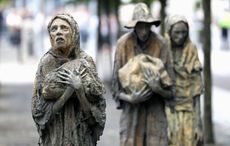"MY Irish friend, in attempting to visit me in Chicago, was denied entry under 214(b). Is there any chance that if he applies again the results might change? He has not been to the U.S. in two years and he has not overstayed his previous tourist visas. He has, from their point of view two years ago, spent too much time in the U.S. on tourist visas. Since he has not applied in two years, is there an improved chance if he applies now?"
YOUR friend's refusal under Section 214(b) of the Immigration and Nationality Act indicates that he was unable to satisfy the consular officer handling his case that he had binding ties to Ireland that would prevent him from becoming an overstay in the U.S.
All applicants for non-immigrant visas -- in this case, your friend would have been applying for a B-2 tourist visa -- must provide evidence that they will return home once the visa expires. As Section 214(b) states, "Every alien shall be presumed to be an immigrant until he establishes to the satisfaction of the consular officer, at the time of application for admission, that he is entitled to a nonimmigrant status."
How is one make the leap from presumptive immigrant to approved non-immigrant? Evidence of "compelling social and economic ties abroad," according to the State Department.
Such evidence could consist of ongoing employment, property ownership, family ties, active bank accounts and things of that nature that a visa holder would (likely) not want to abandon.
Generally speaking, older, more "established" B visa applicants stand a greater chance of being approved for a visa, simply because they've had more time to create permanent careers, own property and start families of their own, at home.
Younger applicants, especially those who may be jobless with seemingly no good reason to depart the U.S. in accordance with the visa terms, often have a harder time getting approval and are thus denied entry to the U.S.
However, 214(b) denials are not considered to be permanent bars to the U.S., and the rejected applicant is free to re-apply for a visa at any time. Obviously, in re-applying the applicant would have to shore up the evidence of ties to home.
According to the State Department, "The consular officer will reconsider a case if an applicant can show further convincing evidence of ties outside the U.S. Unfortunately, some applicants will not qualify for a nonimmigrant visa, regardless of how many times they reapply, until their personal, professional, and financial circumstances change considerably."
You don't say if your friend ever availed of the visa waiver program, which allows natives of 27 countries, Ireland included, to enter the U.S. for up to 90 days, without having to obtain a B visa. But regardless, the fact that he was suspected of spending too much time in the U.S. is absolutely grounds for denial of entry, and as such, in order to re-enter the U.S., he would have to go through the process of applying for a B-2 visa. (Those denied entry to the U.S. on previous attempts are not permitted avail of the visa waiver program.)
Since two years have passed since his last denial, hopefully your friend has developed ties to Ireland that will convince a U.S. consular office in Dublin that he intends to return after his stay in the U.S.
"An applicant can influence the (consular office) to change a prior visa denial only through the presentation of new convincing evidence of strong ties," says the State Department.
For more information, visit http://travel.state. gov/visa/frvi/denials/denials_1361.html.




Comments